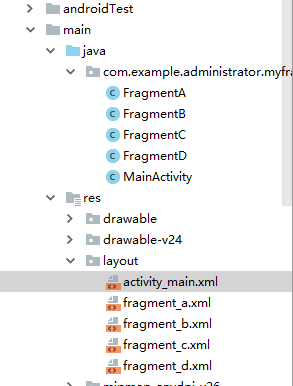Android底部导航栏的简单写法
MainActivity.class文件
package com.example.administrator.myfragment;
import android.graphics.Color;
import android.support.v4.app.FragmentManager;
import android.support.v4.app.FragmentTransaction;
import android.support.v7.app.AppCompatActivity;
import android.os.Bundle;
import android.view.View;
import android.widget.ImageView;
import android.widget.LinearLayout;
import android.widget.RelativeLayout;
import android.widget.TextView;
public class MainActivityextends AppCompatActivityimplements View.OnClickListener{
private FragmentManagerfragmentManager;//
private RelativeLayoutr1_content;
private ImageViewitem1_iv,item2_iv,item3_iv,item4_iv;
private TextViewitem1_tv,item2_tv,item3_tv,item4_tv;
private LinearLayoutitem1,item2,item3,item4;
private ImageView[]ivs;
private TextView[]tvs;
@Override
protected void onCreate(Bundle savedInstanceState) {
super.onCreate(savedInstanceState);
setContentView(R.layout.activity_main);
initView();
fragmentManager=getSupportFragmentManager();
initListener();
setCheck(0);//选中第一个,在开始时候显示选中
}
//初始化,获取对象地址
private void initView(){
r1_content=(RelativeLayout)findViewById(R.id.rl_content);
item1_iv=(ImageView)findViewById(R.id.item1_iv);
item1_tv=(TextView)findViewById(R.id.item1_tv);
item1=(LinearLayout)findViewById(R.id.item1);
item2_iv=(ImageView)findViewById(R.id.item2_iv);
item2_tv=(TextView)findViewById(R.id.item2_tv);
item2=(LinearLayout)findViewById(R.id.item2);
item3_iv=(ImageView)findViewById(R.id.item3_iv);
item3_tv=(TextView)findViewById(R.id.item3_tv);
item3=(LinearLayout)findViewById(R.id.item3);
item4_iv=(ImageView)findViewById(R.id.item4_iv);
item4_tv=(TextView)findViewById(R.id.item4_tv);
item4=(LinearLayout)findViewById(R.id.item4);
ivs=new ImageView[]{item1_iv,item2_iv,item3_iv,item4_iv};
tvs=new TextView[]{item1_tv,item2_tv,item3_tv,item4_tv};
}
public void initListener(){
item1.setOnClickListener(this);
item2.setOnClickListener(this);
item3.setOnClickListener(this);
item4.setOnClickListener(this);
}
@Override
public void onClick(View view) {
switch (view.getId()) {
case R.id.item1: {
FragmentTransaction transaction=fragmentManager.beginTransaction();
transaction.replace(R.id.rl_content,new FragmentA());
transaction.commit();
setCheck(0);
break;
}
case R.id.item2: {
FragmentTransaction transaction=fragmentManager.beginTransaction();
transaction.replace(R.id.rl_content,new FragmentB());
transaction.commit();
setCheck(1);
break;
}
case R.id.item3: {
FragmentTransaction transaction=fragmentManager.beginTransaction();
transaction.replace(R.id.rl_content,new FragmentC());
transaction.commit();
setCheck(2);
break;
}
case R.id.item4: {
FragmentTransaction transaction=fragmentManager.beginTransaction();
transaction.replace(R.id.rl_content,new FragmentD());
transaction.commit();
setCheck(3);
break;
}
default:break;
}
}
public void setCheck(int itemId){
for(int i=0;i<4;i++)
{
ivs[i].setColorFilter(Color.parseColor("#0f0f0f"));
tvs[i].setTextColor(Color.parseColor("#0f0f0f"));
}
ivs[itemId].setColorFilter(Color.GREEN);
tvs[itemId].setTextColor(Color.GREEN);
}
}
activity_main.mxl
xmlns:app="http://schemas.android.com/apk/res-auto"
xmlns:tools="http://schemas.android.com/tools"
android:layout_width="match_parent"
android:layout_height="match_parent"
tools:context=".MainActivity"
android:orientation="vertical">
android:id="@+id/rl_content"
android:layout_width="match_parent"
android:layout_height="0dp"
android:layout_weight="1">
android:layout_width="match_parent"
android:layout_height="1dp"
android:background="#797878"/>
android:layout_width="match_parent"
android:layout_height="80dp"
android:orientation="horizontal">
android:id="@+id/item1"
android:layout_width="0dp"
android:layout_weight="1"
android:layout_height="match_parent"
android:orientation="vertical">
android:id="@+id/item1_iv"
android:layout_width="match_parent"
android:layout_height="0dp"
android:layout_weight="3"
android:layout_margin="3dp"
android:scaleType="fitCenter"
android:src="@drawable/tu"
android:padding="1dp"/>
android:id="@+id/item1_tv"
android:text="女王"
android:textSize="16sp"
android:layout_width="match_parent"
android:layout_height="0dp"
android:layout_weight="1"
android:gravity="center"/>
android:id="@+id/item2"
android:layout_width="0dp"
android:layout_weight="1"
android:layout_height="match_parent"
android:orientation="vertical">
android:id="@+id/item2_iv"
android:layout_width="match_parent"
android:layout_height="0dp"
android:layout_weight="3"
android:layout_margin="3dp"
android:scaleType="fitCenter"
android:src="@drawable/tu"
android:padding="4dp"/>
android:id="@+id/item2_tv"
android:text="美妆"
android:textSize="16sp"
android:layout_width="match_parent"
android:layout_height="0dp"
android:layout_weight="1"
android:gravity="center"/>
android:id="@+id/item3"
android:layout_width="0dp"
android:layout_weight="1"
android:layout_height="match_parent"
android:orientation="vertical">
android:id="@+id/item3_iv"
android:layout_width="match_parent"
android:layout_height="0dp"
android:layout_weight="3"
android:layout_margin="3dp"
android:scaleType="fitCenter"
android:src="@drawable/tu"
android:padding="5dp"/>
android:id="@+id/item3_tv"
android:text="衣帽"
android:textSize="16sp"
android:layout_width="match_parent"
android:layout_height="0dp"
android:layout_weight="1"
android:gravity="center" />
android:id="@+id/item4"
android:layout_width="0dp"
android:layout_weight="1"
android:layout_height="match_parent"
android:orientation="vertical">
android:id="@+id/item4_iv"
android:layout_width="match_parent"
android:layout_height="0dp"
android:layout_weight="3"
android:layout_margin="3dp"
android:scaleType="fitCenter"
android:src="@drawable/tu"
android:padding="3dp"/>
android:id="@+id/item4_tv"
android:text="鞋包"
android:textSize="16sp"
android:layout_width="match_parent"
android:layout_height="0dp"
android:layout_weight="1"
android:gravity="center" />
新建的几个Fragment
btnMainOne =(Button)findViewById(R.id.btn_main_one);
btnMainOne.setOnClickListener(new View.OnClickListener() {
@Override
public void onClick(View v) {
mFragmentTransaction=getFragmentManager().beginTransaction();
mFragmentTransaction.replace(R.id.fl_main,new FragmentOne());
//设置简单的过度动画
mFragmentTransaction.setTransition(FragmentTransaction.TRANSIT_FRAGMENT_OPEN);
mFragmentTransaction.commit();
}
});
FragmentTransaction使用注意
每次在使用FragmentTransaction的时候都需要重新获取,每一个FragmentTransaction只能够commit()一次。
错误代码:
btnMainOne =(Button)findViewById(R.id.btn_main_one);
mFragmentTransaction=getFragmentManager().beginTransaction();
/* FragmentTransaction的获取挪到了点击事件之前 */
btnMainOne.setOnClickListener(new View.OnClickListener() {
@Override
public void onClick(View v) {
mFragmentTransaction.replace(R.id.fl_main,new FragmentOne());
//设置简单的过度动画
mFragmentTransaction.setTransition(FragmentTransaction.TRANSIT_FRAGMENT_OPEN);
mFragmentTransaction.commit();
}
});
错误使用中把FragmentTransaction的获取挪到了点击事件之前,这样在点击第二次的时候就会出现错误。
添加到返回栈
在使用Fragment的时候,我们经常会有一个这样的需求,就是需要通过返回键让fragment回复到之前的一个状态。使用FragmentTransaction就能很容易做到
mFragmentTransaction.addToBackStack(null);//添加fragment到返回栈
其实主要就是通过addToBackStack()这个方法,在commit()之前使用,能够保留commit之前的状态,在使用返回键时,能够回到之前的状态。
private void initViewTwo() {
//主要逻辑在MainActivity的onClick中
btnMainOne =(Button)findViewById(R.id.btn_main_one);
btnMainOne.setOnClickListener(this);
btnMainTwo =(Button)findViewById(R.id.btn_main_two);
btnMainTwo.setOnClickListener(this);
btnMainThree =(Button)findViewById(R.id.btn_main_three);
btnMainThree.setOnClickListener(this);
}
@Override
public void onClick(View v) {
//每次点击事件都会重新获取FragmentTransaction
mFragmentTransaction=getFragmentManager().beginTransaction();
switch (v.getId()){
case R.id.btn_main_one:
if(fraOne==null){
fraOne=new FragmentOne();
}
mFragmentTransaction.replace(R.id.fl_main,fraOne);
mFragmentTransaction.addToBackStack(null);//添加fragment到返回栈
mFragmentTransaction.commit();
break;
case R.id.btn_main_two:
if(fraTwo==null){
fraTwo=new FragmentTwo();
}
mFragmentTransaction.replace(R.id.fl_main,fraTwo);
mFragmentTransaction.addToBackStack(null);//添加fragment到返回栈
mFragmentTransaction.commit();
break;
case R.id.btn_main_three:
if(fraThree==null){
fraThree=new FragmentThree();
}
mFragmentTransaction.replace(R.id.fl_main,fraThree);
mFragmentTransaction.addToBackStack(null);//添加fragment到返回栈
mFragmentTransaction.commit();
break;
}
}
FragmentTransaction管理的Fragment生命周期状态
在我们Android中,对Fragment的操作都是通过FragmentTransaction来执行的。而如果从Fragment的结果来看,FragmentTransaction中对Fragment的操作大致可以分为两类:
1、显示操作:add()、 replace()、 show()、 attach()
2、隐藏操作:remove() 、hide() 、detach()
对于每一组方法,虽然最后产生的效果有点类似,但方法背后带来的副作用以及对Fragment的生命周期的影响都不尽相同。
add() VS replace()
只有在Fragment数量大于等于2的时候,调用add()还是replace()的区别才能体现出来。当通过add()连续两次添加Fragment的时候,每个Fragment生命周期中的onAttach()-onResume()都会被各调用一次,而且两个Fragment的View会被同时attach到containerView中。
同样,退出Activty时,每个Fragment生命周期中的onPause() - onDetach()也会被各调用一次。
但是当使用replace()来添加Fragment的时候,第二次添加的Fragment会导致第一个Fragment被销毁(在不使用回退栈的情况下),即执行第二个Fragment的onAttach()方法之前会先执行第一个Fragment的onPause()-onDetach()方法,与此同时containerView会detach掉第一个Fragment的View
文章来源与网络,本人只是记录知识点而已。
